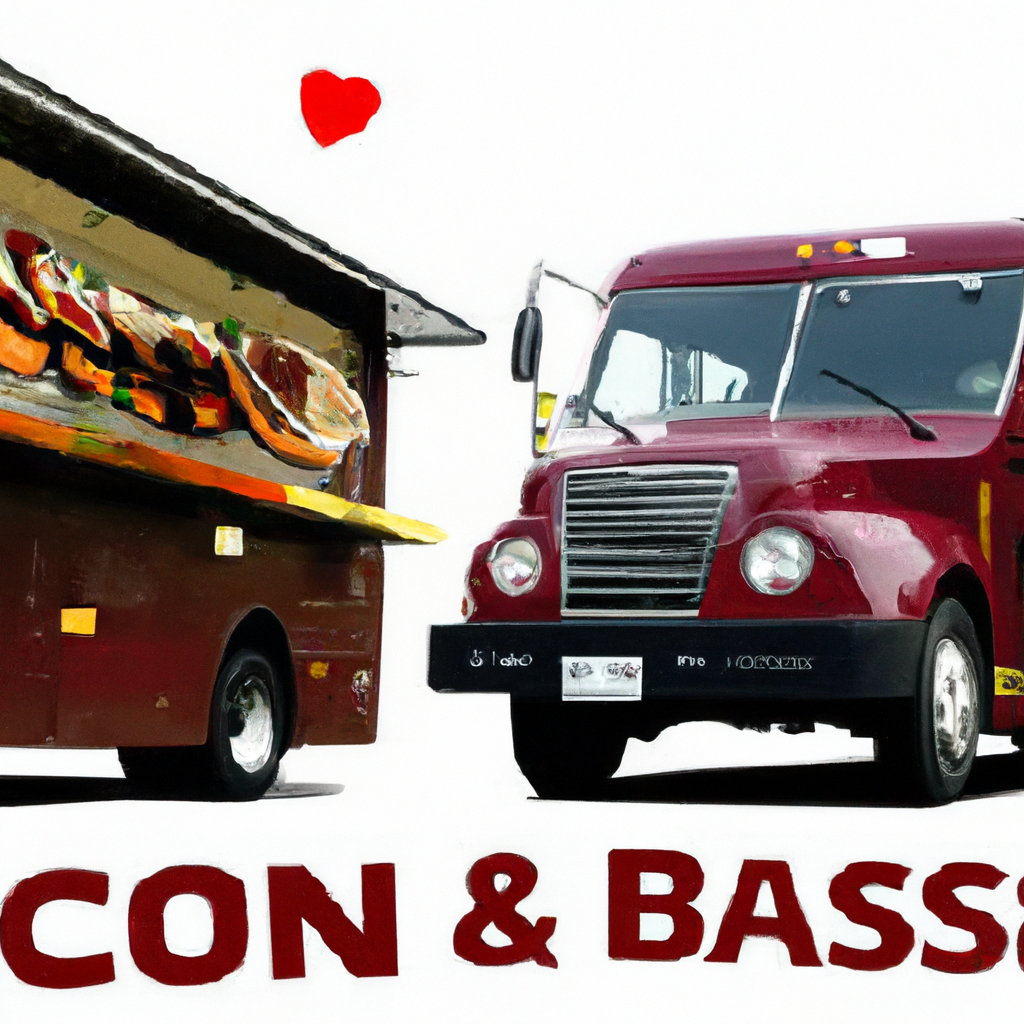So, you’ve got a passion for food and an entrepreneurial spirit, and you’re wondering how to turn that into a successful business venture. Well, look no further! In this article, we’ll guide you through the essential steps of starting your very own food truck or catering business. Whether you’re dreaming of serving piping hot tacos straight from the window of a vibrant food truck or want to cater elegant events with your delectable culinary creations, we’ve got you covered. From securing the necessary permits to designing a mouthwatering menu, we’ll show you exactly how to get started on this exciting journey. So, let’s roll up our sleeves and start cooking up the recipe for your food business success!
1. Business Planning
Starting a food truck or catering business can be an exciting and rewarding venture. However, it requires careful planning and preparation to ensure its success. Here are some essential steps to consider when starting your own food truck or catering business.
1.1 Determine your niche and target market
Before diving into the world of food trucks and catering, it is important to determine your niche and target market. Consider the type of cuisine you want to offer and identify the specific audience you want to cater to. This could be anything from serving gourmet burgers to providing vegan-friendly options. Understanding your niche and target market will help you tailor your menu and marketing efforts effectively.
1.2 Define your menu and concept
Once you have identified your niche and target market, it’s time to define your menu and concept. Think about what sets your food truck or catering business apart from others. Consider creating a unique menu with signature dishes or a theme that customers can associate with your brand. Your menu and concept should reflect the preferences and tastes of your target audience, ensuring that you offer something that stands out from the competition.
1.3 Research your competitors
Understanding the competitive landscape of the food truck and catering industry is crucial for your success. Take the time to research your competitors and analyze their strengths and weaknesses. This research will help you identify gaps in the market that you can fill with your concept. Additionally, staying informed about what others are doing will inspire you to innovate and differentiate your business.
1.4 Create a business plan
A well-crafted business plan is essential for any new venture, including a food truck or catering business. It serves as a roadmap for your business, outlining your goals, strategies, and financial projections. Your business plan should include information about your target market, competitive analysis, marketing strategies, and financial projections. It will not only help you stay focused but also serve as a valuable tool when seeking funding or approaching potential investors.
1.5 Set your budget and secure funding
Starting a food truck or catering business requires an initial investment, and it is crucial to set a budget and secure adequate funding. Consider all the costs involved, including vehicle or equipment purchase/lease, permits and licenses, insurance, ingredients, marketing, and staffing. If you do not have sufficient personal funds, consider approaching banks, credit unions, or exploring government-backed loans, grants, or crowdfunding platforms. Having a clear budget and securing funding will give you the financial stability to get your business off the ground.
2. Legal Requirements and Permits
Complying with legal requirements and obtaining the necessary permits is an essential part of starting a food truck or catering business. Failure to do so can result in hefty fines or even the closure of your business. Here are some important legal considerations:
2.1 Obtain necessary licenses and permits
Depending on your location, you will need to obtain various licenses and permits to operate a food truck or catering business. These may include a business license, food handler’s permit, health department permits, and parking permits. Research the specific requirements for your area and ensure that you have all the necessary documentation before starting your operations.
2.2 Register your business
Registering your food truck or catering business as a legal entity is important for tax purposes and liability protection. Consider consulting with a business attorney or accountant to guide you through the process. They can help you determine the most suitable legal structure for your business, whether it be a sole proprietorship, partnership, limited liability company (LLC), or corporation.
2.3 Determine food handling and safety regulations
Food safety is of utmost importance in the foodservice industry. Familiarize yourself with the food handling and safety regulations in your area. This includes proper food storage, preparation, and handling procedures. Train your staff on these regulations to ensure the safe and hygienic operation of your food truck or catering business.
2.4 Get insurance coverage
Accidents and unforeseen circumstances can happen in any business, and the food industry is no exception. Protect your food truck or catering business by obtaining the necessary insurance coverage. This may include general liability insurance, commercial auto insurance (if you own a food truck), and workers’ compensation insurance (if you have employees). Consult with an insurance agent to determine the most suitable coverage for your business needs.

3. Finding the Right Vehicle or Equipment
Choosing the right vehicle or equipment is critical to the success of your food truck or catering business. Consider the following factors when making your decision:
3.1 Choose between a food truck or catering setup
Decide whether you want to operate a food truck or focus solely on catering. Food trucks allow you to be mobile and cater to various locations, while catering setups are typically based in a central kitchen and serve events or private parties. Consider your target market and business goals when deciding which option is best for you.
3.2 Decide on the size and layout of the vehicle or equipment
If you opt for a food truck, choose a size and layout that suits your needs. Consider the type of cuisine you will be serving and ensure that there is enough space for food storage, preparation, and cooking. If you decide on a catering setup, invest in the appropriate equipment and ensure that it is easily transportable.
3.3 Consider equipment and appliances needed
Equip your food truck or catering setup with the necessary appliances and equipment to operate efficiently. This may include refrigeration units, cooking equipment, prep stations, and serving counters. Research reputable suppliers or manufacturers to ensure the quality and durability of your equipment.
3.4 Research suppliers and manufacturers
Take the time to research and compare suppliers or manufacturers for your vehicle or equipment needs. Consider factors such as cost, quality, customer reviews, and warranty options. Establishing relationships with reliable suppliers will ensure timely delivery and excellent customer service.
3.5 Purchase or lease the necessary vehicle or equipment
Once you have identified the right vehicle or equipment, decide whether to purchase or lease it. Purchasing offers ownership and the flexibility to customize, but it requires a significant upfront investment. Leasing provides more flexibility in terms of upgrades and maintenance but may involve monthly payments. Consider your budget and long-term business goals when making this decision.
4. Menu Development and Ingredients
Developing an enticing menu using high-quality ingredients is key to attracting and retaining customers. Consider the following factors when planning your menu:
4.1 Identify your target audience’s preferences
Understand the preferences and dietary habits of your target audience. Conduct market research or surveys to gather insights into their culinary preferences. This will help you tailor your menu to their tastes and increase customer satisfaction.
4.2 Plan a diverse menu with signature dishes
Offer a diverse menu that caters to different tastes and preferences. Include signature dishes that set your food truck or catering business apart from others. Consider highlighting regional specialties or incorporating unique flavor combinations to intrigue customers.
4.3 Source high-quality ingredients
Procure high-quality ingredients from reliable suppliers to ensure the freshness and taste of your dishes. Consider using locally sourced ingredients whenever possible to support local growers and enhance the sustainability of your business. Build relationships with suppliers to maintain consistency in ingredient quality.
4.4 Consider any dietary restrictions or preferences
Incorporate options for customers with dietary restrictions or preferences, such as vegetarian, vegan, gluten-free, or dairy-free dishes. This will expand your customer base and provide inclusivity. Clearly label menu items and communicate any potential allergens to ensure customer safety.

5. Branding and Marketing
Creating a strong brand and implementing effective marketing strategies are essential to attract customers and build a loyal following. Consider the following steps:
5.1 Create a catchy and memorable business name
Choose a business name that reflects your concept and is easy to remember. It should resonate with your target audience and be unique enough to make your business stand out. Conduct a thorough search to ensure that the name is not already in use and that the corresponding domain is available for your website.
5.2 Design a visually appealing logo and branding
Invest in professional logo design and branding that aligns with your concept and target market. Your logo should be visually appealing and easily recognizable. Use consistent branding across your physical vehicle or setup, website, social media profiles, and marketing materials to create a cohesive and memorable brand image.
5.3 Develop a strong online presence
In today’s digital age, having a strong online presence is crucial for promoting your food truck or catering business. Create a professional website that showcases your menu, location, and contact information. Optimize your website for search engines to improve visibility. Additionally, create profiles on popular review platforms and online directories to increase your online visibility.
5.4 Utilize social media platforms
Social media platforms such as Facebook, Instagram, and Twitter provide powerful tools for engaging with potential customers and promoting your business. Post enticing photos of your dishes, share behind-the-scenes content, and interact with your followers. Run targeted ads on social media to reach a wider audience and build brand recognition.
5.5 Implement effective marketing strategies
In addition to online marketing, consider traditional marketing strategies to reach your target audience. This may include distributing flyers, participating in local food events, partnering with other local businesses, or offering promotional discounts. Constantly evaluate the effectiveness of your marketing strategies and make adjustments as needed to maximize your reach and impact.
6. Staffing and Training
Hiring and training the right staff is essential to provide an exceptional customer experience and maintain the quality of your food truck or catering business. Consider the following steps:
6.1 Determine the number of employees needed
Evaluate the operational needs of your food truck or catering business to determine the number of employees required. Consider the roles of chefs, cooks, servers, cashiers, and any other support staff.
6.2 Advertise job openings and conduct interviews
Advertise job openings on job boards, social media, and local community platforms. Conduct thorough interviews to assess potential candidates’ skills, experience, and fit with your business culture. Look for individuals who are passionate about food and customer service.
6.3 Train your staff on food preparation and customer service
Provide comprehensive training to your staff on food preparation, safety protocols, and customer service. Ensure they understand your menu, portion sizes, and quality standards. Customer service training should focus on delivering exceptional experiences, handling challenging situations, and maintaining a friendly demeanor.
6.4 Establish a positive work culture
Foster a positive work culture where employees feel valued and motivated. Encourage open communication and provide opportunities for professional development. Recognize and reward outstanding performance to boost morale and encourage loyalty.

7. Finding Locations and Events
Strategically selecting locations and participating in events are crucial to reaching your target audience and increasing visibility. Consider the following steps:
7.1 Scout for potential locations
Identify high foot traffic areas where your target audience is likely to be present. Look for popular lunch spots, business parks, college campuses, and special event venues. Consider the local regulations on where food trucks can operate and secure any necessary permits.
7.2 Attend local food truck festivals and events
Participate in local food truck festivals, community events, and farmers’ markets. These events attract a large number of potential customers and provide an opportunity to showcase your culinary offerings. Network with other food truck owners and event organizers to stay connected with the local food truck community.
7.3 Establish partnerships with local businesses
Collaborate with local businesses to offer lunchtime or after-work catering services. Partner with office buildings, breweries, or event venues to provide your services on a regular basis. Building strong relationships with local businesses can lead to recurring customers and increased exposure.
7.4 Cater to private events and weddings
Offer catering services for private events, weddings, and parties. Develop a catering menu specifically designed for these occasions, and market your services to event planners, wedding venues, and individuals looking for unique dining experiences. Establishing a reputation for exceptional catering services can lead to a steady stream of bookings.
8. Managing Finances and Operations
Efficiently managing your finances and day-to-day operations is crucial for the long-term success of your food truck or catering business. Consider the following steps:
8.1 Track expenses and maintain financial records
Maintain detailed records of all business expenses, including ingredients, equipment, marketing materials, permits, licenses, and staff wages. Use accounting software or hire an accountant to track your income and expenses accurately. Regularly review financial statements to identify areas for improvement.
8.2 Establish pricing strategies and profit margins
Set your menu prices strategically to ensure profitability while remaining competitive in the market. Consider factors such as ingredient costs, overhead expenses, and desired profit margins. Monitor industry trends and adjust your prices accordingly to stay competitive.
8.3 Efficiently manage inventory and supplies
Implement inventory management systems to keep track of ingredient and supply levels. Minimize waste by ordering only what is necessary and optimizing storage and rotation practices. Regularly review your inventory to ensure freshness and prevent stock shortages.
8.4 Streamline order taking and payment process
Invest in technology to streamline your order taking and payment process. Use mobile ordering apps, point-of-sale systems, or online ordering platforms to enhance customer convenience and reduce wait times. Accept a variety of payment methods, including cash, credit cards, and mobile wallets.
8.5 Implement technology for business operations
Utilize technology to streamline your business operations. Use scheduling and communication apps to coordinate staff shifts and manage customer inquiries. Implement inventory management software to automate reordering and avoid stockouts. Explore food delivery service partnerships to expand reach and cater to customers’ changing needs.

9. Building Customer Relationships and Feedback
Building strong customer relationships is paramount to the success of your food truck or catering business. Encouraging feedback and implementing loyalty programs will help enhance customer satisfaction. Consider the following steps:
9.1 Provide exceptional customer service
Deliver exceptional customer service at all times. Train your staff to greet customers with a smile, take orders accurately, and handle inquiries or complaints effectively. Encourage your team to go the extra mile to ensure that customers have a positive experience and feel valued.
9.2 Encourage customer feedback and reviews
Invite customers to provide feedback on their experience through in-person conversations, comment cards, or online platforms. Regularly monitor and respond to online reviews to show that you value and acknowledge customer opinions. Use feedback to identify areas for improvement and make adjustments to your menu, service, or marketing strategies.
9.3 Implement loyalty programs and discounts
Reward loyal customers and encourage repeat business by implementing a loyalty program. This could include offering discounts, freebies, or VIP privileges to customers who frequent your food truck or use your catering services. Loyalty programs can help build long-term relationships and increase customer retention.
9.4 Respond to customer inquiries and complaints
Promptly respond to customer inquiries and address any complaints or issues that arise. Take the opportunity to turn a negative experience into a positive one by offering resolution options such as refunds, replacements, or future discounts. Show customers that their satisfaction is your top priority.
9.5 Build partnerships with local businesses for referrals
Establish partnerships with local businesses, such as coffee shops, bars, or retail stores, to cross-promote and refer customers to each other. Offer mutually beneficial promotions or discounts to encourage referrals. Networking with other local businesses can expand your customer base and strengthen your presence in the community.
10. Scaling and Growing the Business
As your food truck or catering business gains momentum, you may consider scaling and growing your operations. Here are some points to consider:
10.1 Identify opportunities for expansion
Evaluate opportunities for expanding your business, such as opening a second food truck location, launching a brick-and-mortar restaurant, or expanding your catering services. Conduct market research and feasibility studies to assess the potential success and demand for your business in new locations or markets.
10.2 Explore franchising or licensing options
If you have a successful and replicable business model, you may consider franchising or licensing your concept to expand your reach. This allows others to operate their own food trucks or catering businesses under your established brand. Seek legal advice and develop comprehensive franchise or licensing agreements to protect your brand and ensure consistency.
10.3 Consider additional revenue streams
Diversify your business by exploring additional revenue streams. This could include selling merchandise, offering cooking classes, providing meal prep services, or launching a food product line. Identify opportunities that align with your brand and target market to generate additional income and enhance customer engagement.
10.4 Continuously innovate and adapt to customer demands
Stay ahead of the competition and remain relevant by continuously innovating and adapting to customer demands. Regularly refresh your menu to incorporate new trends and seasonal ingredients. Seek customer feedback and conduct market research to identify emerging preferences or dietary restrictions that you can accommodate.
10.5 Seek professional advice and guidance
As your food truck or catering business grows, consider seeking professional advice and guidance from industry experts, consultants, or business mentors. They can provide valuable insights and help you navigate challenges, evaluate growth opportunities, and optimize your operations. Learn from their experiences and apply their knowledge to fuel your business’s success.
Starting a food truck or catering business requires careful planning, attention to detail, and a passion for food and customer service. By following these comprehensive steps and continually striving for excellence, you can build a successful and thriving enterprise in the exciting world of mobile food operations. Good luck on your journey!




